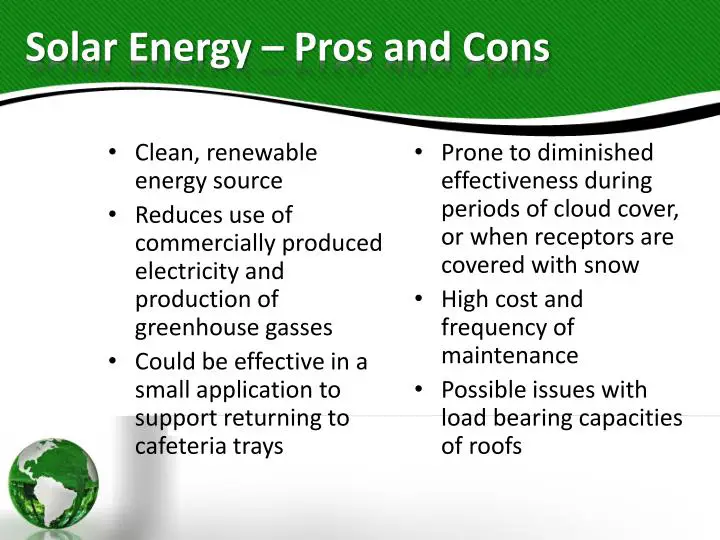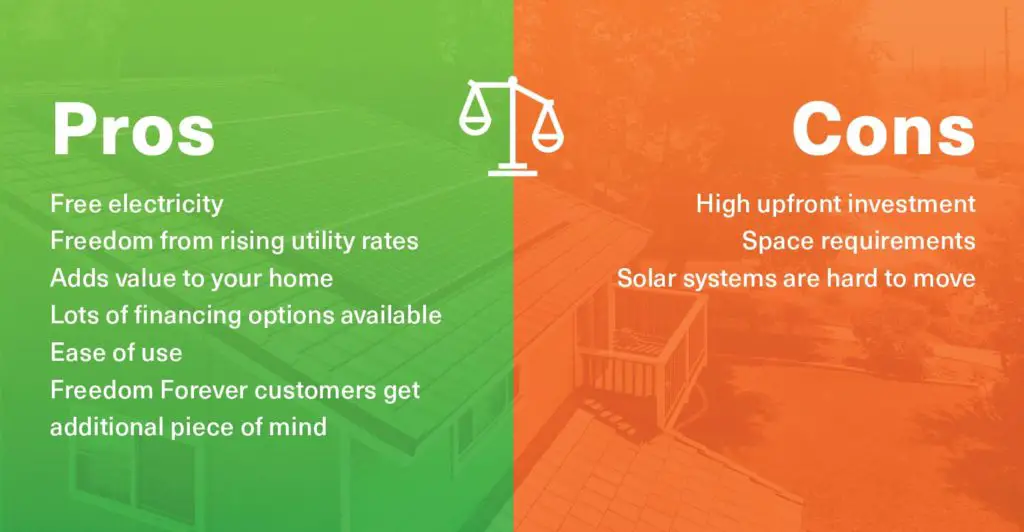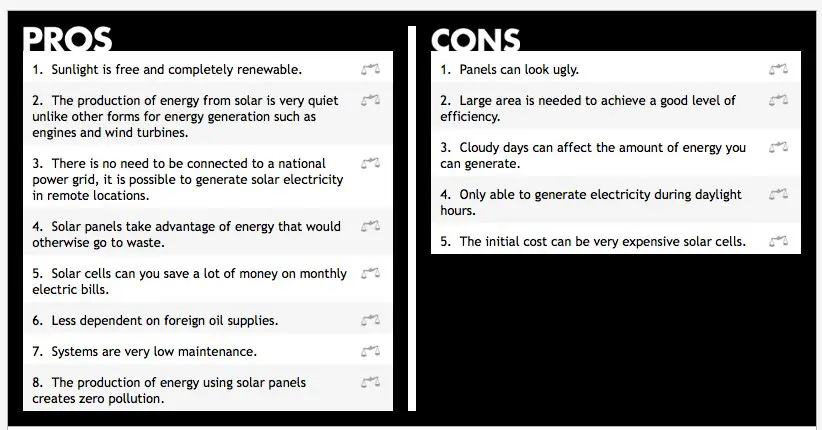Pro Almost Zero Maintenance
Solar power systems have no moving parts, few mechanical elements and very little to go wrong. Therefore, they need almost zero maintenance. As long as you use good quality panels and components and quality installers, you should be able to fit and forget your solar system.
As long as the rain can keep panels clean and everything remains in good condition, a solar power system could be generating energy for up to 25 years before anything needs replacing.
Low Efficiency Of Solar Panels
One of the drawbacks of solar technology is the low efficiency of solar panels when converting the suns energy into electricity, meaning that a great deal of energy is lost in the process.
Most commercially available panels reach only 15 to 18 percent efficiency. This means you need more panels to cover your energy needs, resulting in higher initial installation costs and a larger area to mount it.
Additionally, low efficiency can be further compromised by manmade dust particles deposited on solar panels. According to a recent study, solar panels in areas with heavy air pollution generate 25 percent less energy than expected. This happens because some pollutants from our industrial activities are sticky and tend to block the sunlight.
On the bright side, this technology is still improving, and new materials are being tested to tackle the issue of efficiency under different conditions.
Should You Install Solar Panels
The pros of solar energy greatly outweigh the cons. The cost to install solar is now cheaper than ever, the solar tax credit has been extended until 2023, and the price of electricity is only going to continue to rise. The sooner you make the switch to solar, the sooner you can start saving.
Use our solar calculator to find out how much solar can save you.
Also Check: How Many Batteries For Home Solar System
Solar Power Systems Have A Long Lifespan
Because installing a solar power system is a considerable investment, consumers do worry about life expectancy. Luckily, one of the primary benefits of solar panels is the long-term health of their physical components. With regular maintenance, you can expect reliable service and financial savings from your system for 25 years and more.
Even better, your solar panels won’t be totally ineffective after that point. Even with a gradual reduction in efficiency, your solar panels can still produce electricity beyond 30 years. They might not provide 100% of your electricity needs, but your solar power system can continue to offset some of your electricity demands and keep saving over time.
Solar Energy Depends On Weather

The sun does not shine 24/7 in a specific location. As a result, solar panels cannot always consistently produce energy at all hours of the day. It is called intermittency. While energy storage comes in many forms, batteries are the most common solution to renewable energy intermittency. Solar panels still generate electricity in foggy or wet conditions, but the amount of electricity produced depends on the cloud cover density and modules efficiency. Yes, solar panels can work on cloudy and rainy days, but not always at their best performance.
Recommended Reading: Why Go Solar In California
Production Of Solar Panels Has A Carbon Footprint
Although environmental concerns tied to the production of solar panels are currently being addressedwith signs of progress in the coming yearsthe amount of harmful greenhouse gases released while manufacturing solar panels is notable. Similarly, there are not widespread methods for recycling solar panels.
According to a report from the Office of Energy Efficiency & Renewable Energy, the average energy payback time for solar panels is between one and four years, depending on the type of system. That means that the energy expended while making solar panels will be made up for within four years of use. Considering solar panels can last between 30 and 40 years, that still leaves a long lifespan that does much more good than harm.
Solar Is Environmentally Friendly
Solar energy generation significantly reduces air pollution and greenhouse gas emissions.
In 2014, the total amount of emitted greenhouse gases in the United States dropped by 17 million metric tons thanks to the increase in solar installations . Such a high potential for reducing greenhouse gas emissions is a promising step towards mitigating human impact on the global climate.
While the majority of other power plants, including renewable geothermal power plants, require water for cooling, solar farms need no water. This decreases water pollution and conserves local water resources for other uses such as drinking and irrigation.
A recent study carried out in England demonstrates that solar farms also have a positive impact on biodiversity.
Recommended Reading: Solar Panels Cost Per Square Foot
Solar Equipment Has Low Maintenance Cost
Compared to other home-related equipment such as furnaces, generators, or HVAC systems, solar panels are primarily non-mechanized. Once put in position, they absorb solar energy and transmit it to your house in the form of electricity without any moving parts. Thus, your panels experience little risk of wear and tear, so maintenance requirements are low.
In the right environment, a solar power system can function for 25 years or more without requiring significant maintenance. For example, if you live in a dry and dusty area, you may only need to wash your solar panels from time to time to keep them in top condition.
To ensure your panels remain in the best possible shape, your system should get an annual checkup from a solar maintenance professional, such as the one offered with Palmetto Protect. For everything you need to know about solar power upkeep, check out our Solar Power Maintenance And Service Guide.
Understanding Commercial Solar Financing Options: Power Purchase Agreement
Is your organization considering going solar? Are you investigating different commercial solar financing options? A solar power purchase agreement may be a viable choice.
Here are four questions organizations often ask about solar PPAs to help decide if this financing option is right for their needs:
Dont Miss: How Much Are Solar Panels For A House In Texas
Don’t Miss: Can I Get Solar Panels On My House
Pros And Cons Of A Solar Lease
There are several advantages to solar leases, including:
- Avoiding the upfront costs of buying solar panels
- The solar company will be in charge of maintaining the panels at no additional cost
- Lowering your overall energy costs during the lease
However, there are a few drawbacks to solar leasing that are important to keep in mind. These can include:
- The cost savings you experience will be much lower compared to if you purchased the panels
- You will always have to pay a monthly leasing fee
- You cannot sell excess energy back to the grid
- You will not be eligible for the federal tax credit or other state or local incentives
- If you sell your home before your solar lease expires, the potential buyers will have to take over the lease
Solar Power Can Be Regarded As Quite Ecologically
Apart from the initial production of solar panels and of solar energy storage, there is virtually no additional pollution associated with the generation of solar energy.
Thus, solar energy can be regarded as one of the cleanest and greenest energy sources that is developed enough to deliver serious amounts of electricity that we currently have on our planet.
Read Also: What’s The Cost Of Installing Solar Panels
Cash In On The Electricity You Dont Use
For most homes in the UK, solar panels generate so much solar power, homeowners dont know what to do with it all which is where the Smart Export Guarantee comes in.
The SEG requires licensed electricity suppliers to offer tariffs to small-scale, low-carbon generators, e.g. houses with solar panels. Any solar-generated electricity that doesn’t get used is sent back to the National Grid, and the household receives money in return.
Solar Is The Most Versatile Form Of Alternative Energy

Unlike other types of alternative energy like wind energy which needs wide open spaces with ample wind changes and hydroelectric power which needs a large water source, solar energy can be used in essentially every environment. This makes solar energy the versatile form of clean alternative energy. While output is lower on cloudy days or in climates without as much regular sun exposure, solar panels are always working. No matter where you live, solar energy is a great investment.
Read Also: How To Apply For Solar Panel
Solar Energy Pros And Cons That Might Surprise You
Renewable Energy, Science and Technology
Everything has pros and conseven solar energy. Curious what could possibly be wrong with something that produces cleaner energy and lower electric bills? Well, you might be surprised. Read on to discover eight important advantages and disadvantages of solar energy.
What Is Nuclear Energy
Nuclear energy has been powering the United States for over 60 years. But how exactly do nuclear power plants generate electricity?
Nuclear energy is formed by splitting uranium or plutonium atoms through chain reactions in a nuclear reactor by a process called nuclear fission. The energy released from splitting the atoms is used to heat water into steam. This steam then turns a turbine, which creates usable electricity.
Experts believe that thorium is another fuel that could be used for nuclear power. Its already being used in countries like India and Russia.
Read Also: How Much Does It Cost To Go Completely Solar
Con: Its Weather Dependent
Solar energy works during cloud and rainy days but its efficiency drops significantly. Just a few cloudy or rainy days could have a noticeable effect on your energy bills bottom line. Most importantly, solar energy cannot be collected during the night, which forces you to install batteries to store energy.
Installation On Rooftops Is Quite Space
If you own a house, solar panels can be regarded to be quite space-efficient since they can literally be installed on your roof and will not take away additional storage space around your house .
Hence, this makes solar energy quite convenient since there is not much storage space necessary to install devices.
Don’t Miss: What Is The Output Of A Solar Panel
Going Solar Can Reduce Your Carbon Emissions
Another one of the main advantages of solar energy is that its a clean and renewable energy source. What this means is that you reduce your greenhouse gas emissions and decrease your environmental impact.
While energy from coal and other fossil fuels tend to create a lot of environmental pollutants, solar energy does not produce any direct pollution at all, which makes it far and away the most environmentally friendly way to power your home.
Reduce Or Eliminate Electric Bills
The biggest pro of solar panels for those looking for costs savings is the potential to reduce or eliminate their electricity bills. This is also what many solar salespeople will start their pitch with.
The whole idea behind solar panels is to generate electricity. That electricity then goes back into the grid. Your utility will subtract the amount of electricity you put into the grid versus what you actually used.
Depending on how much electricity you put into the grid you could potentially have a $0 electric bill in months where you generated more than you used. This billing mechanism is called net metering. If you live in an area with net metering, you can also gain bill credits for the excess energy you produce.
For example, in September you generate 200 kWh of energy but only use 150 kWh. The extra 50 kWh of energy would roll over to your October bill in the form of a bill credit.
There are many caveats here, so it is extremely important to research local net metering laws.
Don’t Miss: How Are Solar Panels Made
The Permitting Process Can Be Time Consuming
Many people dont know this, but before installation can occur, you need to have an approved permit from your local government office. Going solar is unlike getting a new roof or replacing your homes windows.Government restrictions can add weeks to months to a project installation. Depending on how strict your local government is and how quickly permits are approved, the process can be drawn out. Because this can be a time-consuming and burdensome procedure, we take on that responsibility by managing the entire permitting process with your local government. Going into your solar project, keep in mind that this step can add time to a project. Its important to have a clear understanding of the timeline provided by your installer and to stay in close communication with your project manager to make sure this process goes as smoothly as possible.
Get Paid For Solar Power Production

Homeowners currently have many incentives to take advantage of the numerous benefits of solar panels. Though most of these financial perks are backed by the federal government, some states also provide their own incentives. They all aim to first reduce the cost of purchasing a solar power system and then earn consumers additional savings and cashback after installation.
One of the biggest incentives is the federal solar tax credit, also known as the investment tax credit . It applies to both commercial and residential solar power installations, allowing you to deduct up to 26% of the total cost of installing a solar energy system from your federal taxes.
Since there is no cap on how much you can deduct, the ITC can save you tens of thousands of dollars, depending on the type of system you choose. If you are considering a switch to solar power, the ITC will be available in its present form until the end of 2022. If youre interested in learning more, heres Everything You Need To Know About The Solar Tax Credit.
In some areas, you can be recognized as an energy producer via net energy metering . With net metering, the surplus energy your system produces can be channeled to the grid, and you can earn credit toward your electricity bill from it. If your solar panels produce more energy than you consume during the day, you’ll earn credits that you can redeem at times when they arent producing.
You May Like: What Is The Benefit Of Llc Over Sole Proprietorship
They Take Up A Lot Of Space
Solar panels are rather sizable pieces of kit, averaging around 2 m2 per panel and the more electricity you want to generate, the more panels youll need to install. So, the bigger the roof, the better.
If you find yourself running out of room, you can opt for premium, high-efficiency models. Although more expensive, a small number of high-efficiency panels can do the same job as a larger number of standard panels.
Pros And Cons Of Solar Energy: What You Need To Know
While the advantages of solar energy are plenty, there are also some drawbacks. Here are the top solar energy pros and cons to consider when deciding if solar panels are worth it and if solar is right for your home.
| Pros of Solar Energy | |
| Increase value of your home | Savings depend on energy bills |
| Eligible for rebates and tax incentives | Expensive upfront cost |
Well begin with a summary of the biggest advantages of solar energy.
You May Like: How To Charge Ev With Solar Panels
Improve Your Home Value
One of the biggest financial advantages of solar energy systems is that they increase your home value. While the increase will differ based on your location and other factors in the real estate market the home value increase is relatively large.
The National Renewable Energy Laboratory found that home value increases $20 for every $1 in savings on electricity bills. So a solar energy system that saves $200 per year would also add $4,000 to the value of a home.
Additionally, Zillow data shows that homes with solar panels sell for up to 4.1% more than homes without them.
Advantages Of Solar Power
One of the biggest benefits of solar energy is that it is environmentally friendly. Solar panels do not produce any air pollution or greenhouse gases and are more sustainable than fossil fuels like natural gas. Once solar panels are installed, they have a life span of 25 to 30 years. Every kilowatt hour of solar energy that is generated significantly reduces the emission of harmful greenhouse gases like carbon dioxide.
Another one of the advantages of solar energy is that you may be eligible for government tax credits and rebates. There is a federal residential solar energy credit that homeowners can claim for a percentage of the cost of installation of the system. This can help offset the initial cost of installation, making it more affordable for people interested in renewable energy. Additionally, many states offer incentives and rebates for individuals who chose to use renewable energy sources in their homes.
A further solar advantage is that solar panels can help you save money on your energy bill. Depending on which state you live in and how much sunlight you get each day, solar panels can end up saving you thousands of dollars over the course of their life span. While the costs to install solar panels may seem high, they last for a long time, mitigating the costs over time.
Don’t Miss: How To Make Your Own Solar Cells
Cannot Be Used At Night
No energy can be produced by your solar panels at night which essentially means your solar panels can only generate energy 12 hours of a full day. Without any sunlight hitting the solar panels then there will be no energy produced.
This is a disadvantage of solar panels but may be something that is overcome in the future with new technology. There are already talks about an anti solar panel that is able to produce power at night.
